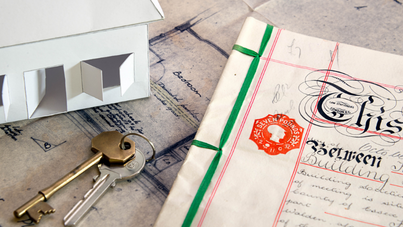Authors
Jointly written by Richard Walford & Zilah Nelson
In our digital age and 30 years on from compulsory registration across the whole UK, one might expect title deeds to be a thing of the past. But unfortunately, a combination of issues has caused title deeds to be lost or destroyed and it is often not until a transaction or development is gathering pace that the problems emerge, with the potential to delay or wreck a deal. We explain the relevant issues and possible answers.
Unregistered and registered land
Before compulsory registration of land started in the 1980s, ownership of property was evidenced through original historic title deeds dating back at least 15 years, with earlier documents required if referred to in the later ones
From the 1980s certain transactions triggered compulsory registration of legal title at H M Land Registry. Once registered, the legal title was evidenced initially by an HM Land Registry paper certificate, and later by the property being logged on HM Land Registry’s computerised registers and by providing an official copy of register. Original title deeds were still relevant, but less important, as copies were available from HM Land Registry or relevant sections were copied onto the register of title. Now all that is required for transactions is the up-to-date copies of the official copy of the register of title.
The perfect storm
Over the last few years a perfect storm for unregistered land (and sometimes even registered land) has developed. Landowners of unregistered land have to produce original title deeds to sell, borrow or let out their land, but increasingly, finding unregistered deeds or pre-registration documents can be challenging. There are a number of factors that have led to this situation:
- Most land is now registered so unregistered land is less commonplace.
- Fewer conveyancers and lawyers are familiar with handling unregistered land or who understand the importance of retaining original title deeds.
- Banks and law firms, who traditionally looked after title deeds, have to comply with new data protection laws requiring that customer data and documents are not retained for any longer than is necessary. They have also sought to reduce their costs of secure storage.
- HM Land Registry has embarked on a dematerialisation policy since 2003 – it no longer retains any original title deeds. All relevant deeds are either copied or summarised onto the computerized register, and then destroyed.
- Society has moved on-line. Records, archives and documentation for all aspects of life are increasingly digital rather than paper based.
- Recycling of paper has become regarded as the socially responsible thing to do.
As a result it is becoming increasingly commonplace for title deeds to have become lost, following their return to their owners or because they have been handed over to third parties in the course of a transaction, when they should have been retained (eg on a sale of part)Alternatively, they may have been destroyed, erroneously, along with any information which has been deemed surplus past a given date.
So why is this a problem?
When unregistered property title deeds are lost it becomes more difficult for the owner to prove their legal title. The answer is often to apply to HM Land Registry for “possessory title” which after 12 years can be upgraded to “title absolute”.
Possessory title is recorded at HM Land Registry, but it is not the same as full legal title or “title absolute”. If an owner wishes to convey, lease or mortgage a property with only a possessory title, they will usually have to purchase a title indemnity insurance policy for a one-off premium payment.
The problem for development land is that the importance of evidencing title and understanding full detail of all rights and covenants binding the property is much greater. Developers and lenders are more exposed to third party challenges and adverse rights when planning or carrying out new developments. The result is that many developers and lenders are not prepared to develop or lend on land with only possessory title. Furthermore, title indemnity insurers may not be prepared to grant defective title indemnity insurance on property, intended for development.
As a result, landowners can be left unable to bring land forward for development or raise development finance over it until title absolute is obtained.
What can be done to avoid this perfect storm?
First and foremost landowners should locate and keep all unregistered title deeds in safe storage. Ideally, certified and electronic copies of the title deeds should also be made and stored safely.
Secondly, landowners should consider applying for voluntary first registration of their property, well in advance of any transaction.
Voluntary registration takes up to around two years to complete and often involves answering numerous title questions raised by HM Land Registry. But it is far better to sort these issues out in advance, so they do not then derail a future transaction. Voluntary registration is also cheaper than an application triggered by a transaction.
Action to deal with lost title deeds
If title deeds are lost, various steps that can be taken to track them down, or even recreate them via alternative investigations and resources. This process will include considering who was responsible for the original deeds and to what extent they should be liable for resolving the problem.
Registered land – what if pre-registration deeds are missing?
For registered property, the situation is much easier. HM Land Registry should have a record of the legal ownership and all registerable rights and obligations affecting the property. In most cases this should be good enough to prove and transact legal title to the property.
However, in some cases, we find HM Land Registry has failed to take a copy of a relevant pre-registration deed, containing rights or burdens affecting the property. Alternatively the register may contain an error or omission. There may also be some rights and obligations affecting the property which are not recorded on the register or are merely noted that they exist (but with no detail); for example licences, leases of up to seven years and wayleaves are not noted on the register.
So it is still a good idea for the landowner to keep the original pre-registration deeds and documents, which do not form part of the legal title, but which may need to be produced on any transaction (eg planning documents, surveys, environmental permits and licences, construction documentation etc).
Local history
For those landowners with an interest in family or local history, original title deeds can also provide a valuable source of insight and information. Public record offices and local historical societies may be interested in acquiring or looking after old deeds.
How Michelmores can help?
Our agricultural land and development teams have many years’ experience of dealing with unregistered land, including tracking down missing deeds, dealing with lost titles, as well as voluntary first registrations of development land. Any landowners, and especially those with potential development land would be well advised to have their deeds and registered titles checked to make sure everything is in order well in advance of any transaction.
Print article


